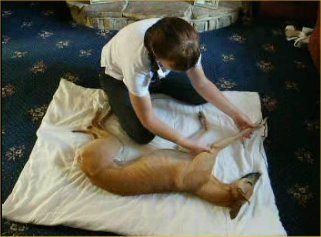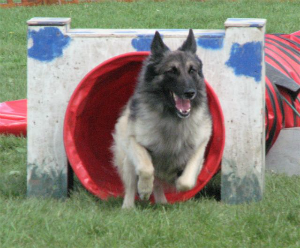 Most people think of Chiropractic as a means of treating a sore back, but it can be used for more than this. When a dog is ill or lame he is often in pain. This can cause the dog to limp or hunch so that he changes his posture and gait to varying degrees. These compensatory changes can then cause secondary problems to occur in other areas of the body, exacerbating the original problem, so that it appears to become worse. Susan Sargeant tells us briefly how chiropractic has helped two of our canine friends who were originally given a poor prognosis:
Most people think of Chiropractic as a means of treating a sore back, but it can be used for more than this. When a dog is ill or lame he is often in pain. This can cause the dog to limp or hunch so that he changes his posture and gait to varying degrees. These compensatory changes can then cause secondary problems to occur in other areas of the body, exacerbating the original problem, so that it appears to become worse. Susan Sargeant tells us briefly how chiropractic has helped two of our canine friends who were originally given a poor prognosis:
Harry had Wobbler syndrome – an instability in the neck that increased compression of the spinal cord. This produced an uncoordinated gait involving both front and hind legs. Harry basically moved as if he was drunk both behind and in front. When his gait was slowed down using digital technology, it was possible to see that the middle of Harry’s spine rolled significantly causing problems the entire length of his spine. When touched he had several hot spots and almost fell or scratched uncontrollably. Harry had continued treatment and due to his owner’s commitment in bringing him regularly he improved significantly, living 4 years longer than his original prognosis! The chiropractic could not help the Wobblers itself, but it did help eliminate the secondary problems so Harry was more comfortable.
Scooby had two cruciate ligament operations involving pins and plates in both hind limbs. The result was that she was very stiff not only in her back legs but her front end and back suffered too. This was due to the compensatory changes she made in her gait and posture to accommodate the stifle problems. Scooby lives some distance away so has treatment less frequently than desired but Chiropractic realigns her spine, increases her mobility and reduces some of the pain and inflammation that builds up. She now swims in conjunction with the treatment and the two work very well together.
These same principles apply to many other bone, joint, muscle and nerve disorders including Hip Dyspalsia, Osteochondrosis (OCD), Spondylitis and DM / CDRM (Degenerative Myelopathy). McTimoney Chiropractic may not cure the original problem, but it can often help with the secondary issues that occur as a consequence. Chiropractic does not take the place of veterinary treatment, but should work alongside it with good communication between vet, chiropractor and owner to establish the best for each dog.
 How often do we as dog owners find that one minute our dogs seem fine but the next they are ‘not quite right’. It is difficult to say when it happened, but over a few weeks or months you may notice small things such as your dog having difficulty getting into the car, up the stairs or onto their favourite chair. Maybe they don’t want to get out of bed, go for a walk or greet you how they used to. They may growl, whimper when touched or worse still, bite. If they are a competition dog their performance may be reduced.
How often do we as dog owners find that one minute our dogs seem fine but the next they are ‘not quite right’. It is difficult to say when it happened, but over a few weeks or months you may notice small things such as your dog having difficulty getting into the car, up the stairs or onto their favourite chair. Maybe they don’t want to get out of bed, go for a walk or greet you how they used to. They may growl, whimper when touched or worse still, bite. If they are a competition dog their performance may be reduced.